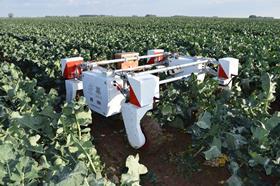
A new specialist agri-robotics training and research centre will be established by the University of Lincoln to help meet food supply challenges of the future.
The centre will be the world's first Centre for Doctoral Training (CDT) for agri-robotics and will help develop cutting edge automated technology and robotics, having received £6.6 million from The Engineering and Physical Sciences Research Council (EPSRC).
The university aims to bring a “massive influx of high-level robotics expertise” to train at least 50 doctoral students, who will be supported by major industry partners, specialising in areas such as autonomous mobility, crop harvesting, soft robotics for handling delicate produce, and “co-bots” for interacting with humans on farms and factories.
With a growing global population, agricultural labour shortages and ecological decline, agriculture is a key target for robotic investment. Professor Tom Duckett, professor of robotics and autonomous systems at Lincoln, says robotics are predicted to add £183 billion to the UK economy in the next ten years.
“Agri-food is the largest manufacturing sector in the UK – twice the scale of automotive and aerospace combined – supporting a food chain, from farm to fork, which generates a Global Value Added of £108bn, with 3.9m employees in a truly international industry,” Duckett said.
“However, the global food chain is under pressure from population growth, climate change, political pressures affecting migration, population drift from rural to urban regions, and the demographics of an ageing population in advanced economies,” Duckett added. “Addressing these challenges requires a new generation of highly skilled RAS researchers and leaders, and our new CDT will be dedicated to delivering those expertise. It will be a real focal point for robotics innovation in the UK.”
The Centre will bring together a unique collaboration of leading researchers from the Universities of Lincoln, Cambridge and East Anglia, located at the heart of UK agri-food business, together with the Manufacturing Technology Centre, supported by leading industrial partners and stakeholders from across the food, farming and robotics industries. These include John Deere, Syngenta, G’s Growers, Beeswax Dyson, ABB and the Agricultural and Horticultural Development Board.
It is one of 75 new Centres for Doctoral Training to be funded by the EPSRC (part of UK Research and Innovation) in what is hailed as one of the country’s most significant investments in research skills, designed to equip the UK with the next generation of doctoral level researchers it needs across the breadth of the engineering and physical sciences landscape.
Director of the Lincoln Institute for Agri-food Technology, Professor Simon Pearson, said:“It is widely agreed that robotics will transform the food and farming industries in the coming years, but there is still a major skills gap in this area. Working with our industry and academic partners to design the 50 PhD scholarships will enable us to expand the UK’s science and engineering base, delivering a flood of skills and expertise that will drive our food and farming industries into the future.”
Professor Richard Harvey, Senior Lecturer in Computer Science at UEA, said research at the centre will target the “unpleasant, difficult and repetitive aspects of farming”.
“Agriculture remains an important and atavistic activity in the UK but it the most dangerous of all the main UK industry sectors.Given that, isn’t it astonishing that so much effort is devoted to robots for driving and delivering parcels to your door?”
“We’d like to build robots that can see when an ear of corn has ripened or be able to measure the amount of sunlight falling on a field of wheat or to tell when beans are ready for picking.This is blue skies research with an East of England flavour and we look forward to developing new systems that handle the challenge of being on a farm.”



